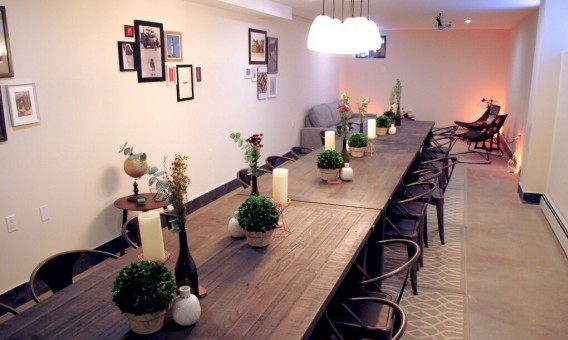Critics said no one would pay a hefty premium to live like a hippie in an urban commune. It seems they were wrong. Having declared its Crown Heights experiment a success, co-living startup Common is now moving towards a new business model based on ground-up development, with plans to build a new 12-suite, 51-bedroom residential complex in South Williamsburg.
Paul Henry’s Patoma Partners – which bought the 248-254 South 3rd Street site in 2012 for $2.4 million – is developing the 20,000-square-foot facility.
It will consist of four five-story buildings with three fully-furnished apartment suites each, plus shared rooftop and outdoor areas, a lounge, a “wellness studio” and a film screening room.
The developer filed permit applications for the buildings at the site back in 2013. Those plans are current, a spokesperson for Common confirmed.
Much like its first project at 1162 Pacific Avenue, prices will range from about $1,800 to $2,650 a month for residents who sign a six- or 12-month lease, and a Midtown-ian $2,250 to $3,190 a month for month-to-month tenants. Those prices include furniture, utilities and amenities like wifi, laundry and cleaning services.
Tenants who pay the higher rates receive larger bedrooms, often with private bathrooms.
Contrary to its initial flexibility-oriented pitch, the co-living firm has seen strong demand for traditional year-long leases. In December, two months after its first building opened, Common rolled out a 10 percent discount for tenants who signed commitments.
Now, over 70 percent of its Crown Heights tenants are signed on for six months or a year, said CEO Brad Hargreaves.
“Generally, they were not people had a need for flexibility,” he said. “They loved community. They wanted to log into [group messaging app] Slack and see whether anyone was cooking pancakes upstairs.”

The dining room at Common’s first complex at 1162 Pacific Street in Crown Heights
The new facility is the company’s first ground-up development, a model the company hopes to build on.
“Going forward, most of our projects are going to be cooperations with developers, for either ground-up developments or gut renovations,” Hargreaves said.
Along with the ability to customize its space, the arrangement offers somewhat wider profit margins. “It’s a little bit better from a financial perspective,” Hargreaves said.
He declined to specify the figures. Paul Henry referred all requests for comment to Common.
Once the residence is built, the company – which raised $7.35 million in Series A funding in July – will act as its master tenant, as it does in its two Crown Heights buildings, though on that front, Hargreaves is planning changes.
“This is one of the last master leases we plan to do,” said the CEO, again citing profitability. “Most of the deals going forward are going to be management agreements.”
Commons’ offerings have proved attractive to tenants, according to Hargreaves. Occupancy at the company’s first two buildings has been “close to 100 percent,” he reported.
“There was more churn than we expected after the first month,” Hargreaves said, “but almost none after that.”
The CEO expects robust demand for its new Williamsburg offering, citing the location’s local amenities – bars, clubs, restaurants – and its faster commute to Manhattan relative to the company’s Crown Heights offerings.
